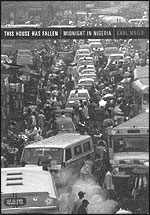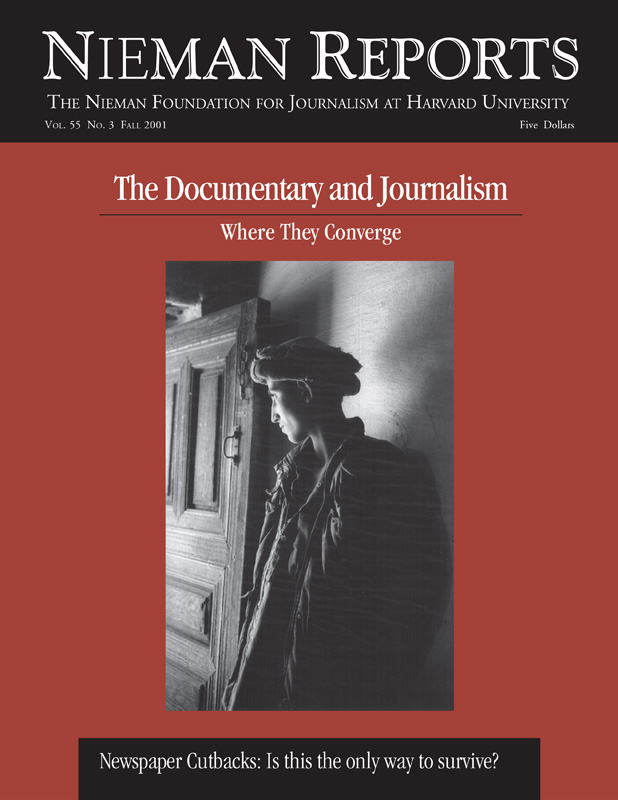
This House Has Fallen: Midnight in Nigeria
Karl Maier
Public Affairs. 327 Pages. $26.Eight years ago a presidential election was held in an African country that was remarkable, given the continent’s gloomy record in holding trouble-free elections. The outcome surprised many. As the results were being tallied, international monitors declared it the most free election ever held in that country. As if this wasn’t surprising enough, the candidate viewed to have the military government’s blessing appeared headed for a major loss. And the voting pattern defied the usual trend in Africa. The leading candidate was drawing support outside his ethnic group.
But before everyone could really savor the excitement, the junta leader, who was not in the running and had promised to step aside once a civilian was chosen, annulled the elections. The military effectively re-asserted its control. The country was suddenly plunged into a crisis from which it only recently began to emerge. The reason why the whole affair was particularly captivating, especially for Africans, was that it took place in Nigeria, the most populous nation on the continent.
Between the 1960’s, when most African nations won independence, and the end of the Cold War, most of them were either run by autocrats or military men. Many scandals were reported by Western correspondents who were not subject to the same repression as their African counterparts. But even a Western journalist rarely could manage to get a one-on-one interview with a leader suspected of ordering an assassination, pocketing a huge cache of public funds, or any other gross misdeed. The idea of glimpsing a political event, from the point of view of an out-of-power leader, is still rare in Africa.
This is one example why Karl Maier’s “This House Has Fallen: Midnight in Nigeria” is remarkable. Through a well-placed contact, he manages to track down Ibrahim Babangida, the former Nigerian strongman who canceled the 1993 elections. Meeting him at his hometown mansion, Maier conducts an intriguing interview. For example, regarding the annulled elections, the author states: “Despite the fact that [Moshood] Abiola broke the mold of presidential politics in Nigeria by winning votes across regional and religious barriers, Babangida attempted to argue that his victory actually threatened Nigeria’s unity…. But Babangida’s version of events did not bear close scrutiny.”
The book is a well-written, enlightening, though sad account of this complex West African nation, which has been hemorrhaging from years of misrule, repression and extreme corruption. The reporting is a skillful mixture of recent Nigerian history, carefully selected interviews, and vibrant local color (“As one columnist put it, Nigerian democracy had gone ‘democrazy.’”) The Africa correspondent for The Independent of London from 1986 to 1996, Maier—an American—has written two other books on Africa, “Angola: Promises and Lies,” and “Into the House of the Ancestors: Inside the New Africa.”
With 110 million people, one of every five black Africans is Nigerian. The nation is a seemingly unwieldy collection of over 250 ethnic groups. Two of the world’s major religions—Christianity and Islam—are well represented in the country. For the United States, it’s the fifth largest supplier of crude oil. Yet it’s one of the 20 poorest countries in the world, according to the World Bank. And, according to the U.S. Energy Department, it suffers an external debt of between $30 to $34 billion and has to pay out $400-$500 million each year just to service it.
There’s an understandable tendency among American foreign correspondents in Africa to subtly point out—in articles or books—why their topics are important. Implicit is the assumption that Africa is quite remote to the ordinary American. To help readers back home, pieces are peppered with comparative examples. One learns that Kenya is roughly the size of Texas; Democratic Republic of the Congo is equal to the United States east of the Mississippi; Burundi is comparable to Connecticut, and so on.
What’s interesting about Maier is that save for the preface, he doesn’t really waste time trying to justify Nigeria’s significance. He just dives into his story. Perhaps this is due to his having worked for a British paper, or he simply feels that the book will mostly be read by those with a pre-existing interest in Africa. Whatever the case, the result is refreshing and proves that there really isn’t a fixed way of reporting on Africa. A good journalist will get the story out, one way or another. And the story will speak for itself.
The Nigeria that emerges, as with much of sub-Saharan Africa, is cause for sobriety. Despite a bloody three-year civil war in the late 1960’s, which left a million people dead, ethnic tensions still simmer and claim lives. Communities in the oil producing regions of the country, such as the Ogonis, feel none of the benefits have come to them, and their poverty is shocking. A breakup of the country cannot be ruled out. Abiola, the presumed winner of the 1993 presidential elections, died three years ago while imprisoned by the authorities for declaring himself Nigeria’s legitimate leader. In 1999 Olusegun Obasanjo, a retired general who ruled Nigeria from 1976 to 1979, was sworn in as a civilian president following an election that was supposed to put an end to military rule. But it’s too early to tell whether democracy will take root. The country has been run by soldiers for all but 13 years since it won independence from Britain in 1960.
Maier, at the beginning of his book, hints at Nigeria’s attractive side. It has produced prized art works; acclaimed writers like Chinua Achebe and the Nobel laureate Wole Soyinka; talented sports figures such as Hakeem Olajuwon of the Houston Rockets, and internationally recognized singers like Sade, Seal and Fela Kuti, whose career and life were cut short by AIDS in 1997. However, the author chooses to focus on the dire challenges presently confronting what he terms “perhaps the largest failed state in the Third World.” And it’s to his credit that he maintains this focus, for one is forced to wonder how a country can squander so much potential. And the urgency to find remedies is keenly felt. He suggests that only if the present government is dead serious about reforming the country, and allows for a wide-ranging national dialogue, will disaster be averted.
Wilson Wanene, a Kenyan-born freelance journalist in Boston, writes on African media and political issues.



